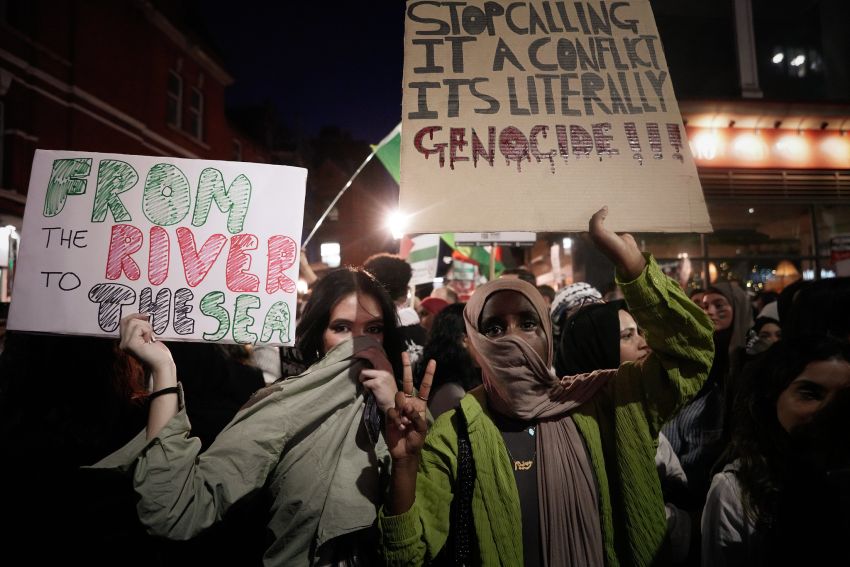
While every day brings fresh horrors, here in Britain, the governing Conservative Party led by Rishi Sunak and Keir Starmer’s opposition Labour, are united in supporting Israel’s decimation of Gaza.
However, resistance to the destruction of Gaza is passionate, strong and having an effect. London has witnessed huge demonstrations calling for a ceasefire. The government is in turmoil, and right-wing Home Secretary Suella Braverman was sacked after she attacked peace protesters.
Starmer is under considerable pressure from normally sleepy and apolitical Labour MPs and councillors. The youth are emboldened and smaller parties, including the Scottish National Party (SNP) and the Greens, are clear in their opposition to the rising death toll.
One of the largest demonstrations in British history took place on November 11, when around 800,000 people marched through London. The protest was organised by the Stop the War Coalition, Palestine Solidarity Campaign, Friends of Al-Aqsa, the Muslim Association of Britain, Palestinian Forum in Britain and Campaign for Nuclear Disarmament.
Sunak had claimed that it was an affront to “the British public and the values we stand for”, arguing that it was wrong to protest on Armistice Day and it might lead to damage to war memorials. Braverman described demonstrations as “hate marches” and tried to ban protest. Criticising the police, implausibly, for left-wing bias in not helping her shut them down, she went too far and was sacked.
Round one to the peace movement!
John Rees of Stop the War noted, "You saw what this movement did to Suella Braverman ... Unless you get yourselves in line with the majority of people in this country who want an immediate ceasefire, this movement will do that to you Rishi Sunak, it will do that to you, Keir Starmer."
Starmer has certainly felt the heat. Labour councillors up and down Britain have been resigning from the party over his failure to call for a ceasefire. Most dramatically, the Party has lost control of Burnley in Lancashire, with former Labour councillors linking with the Green Party and Liberal Democrats to govern the town. Ten councillors have left the Party in Oxford. Fifty-six Labour MPs rebelled and voted to support a motion calling for a ceasefire, out of these, 10 shadow ministers on Starmer’s frontbench resigned.
After the Corbyn years, where peace and Palestinian solidarity took centre stage, Labour under Starmer is dedicated to increasingly right-wing pro-military policies, but these are under challenge from party members.
The SNP (which governs Scotland), Sinn Fein and the Greens have been robust in their support for Palestine and for an immediate ceasefire. The most fervent opposition has been on the streets. Vigils and demonstrations have happened in small towns up and down the country.
School students marched out of class on November 16, in Tower Hamlets in East London, and were quickly condemned by the government for doing so. Hundreds of schoolgoers in Bristol marched out of an assembly addressed by Wes Streeting MP, one of Starmer’s closest allies, on November 3, because of his failure to support peace.
Trade unionists have also been taking action. A BAE Systems factory in Rochester, Kent, which arms the Israeli Defence Force (IDF), was blockaded on November 10. Four hundred unionists from Britain's largest trade unions including Unite, Unison and the UCU took part.
According to the Evening Standard, activists called for an end to the British government’s “complicity in war crimes” being committed in Palestine “by ending arms sales to Israel and supporting an immediate ceasefire”.
“Some protesters are clutching Palestinian flags and signs which say ‘Free Palestine’, ‘UK is guilty’, ‘End the genocide’ and ‘Stop arming Israel’s war machine’.
“At one entrance, the group chanted slogans such as ‘1,2,3,4, occupation no more; 5,6,7,8, Israel is a terrorist state’, and: ‘BAE must be stopped, no more bombs must be dropped’.
The wave of protest together with opinion polls suggesting the majority of voters here support a ceasefire, have significance both to the war on Gaza and to wider British politics.
Protests in the United States and Britain — countries that are allied to and arm Israel — have an effect on Israel’s supposed diplomatic legitimacy in attacking Palestine. Author and journalist Solomon Hughes argues: “Every march, every vote in a Parliament or Senate speeds up the clock.”
The assault on Gaza is bloodier and more visible by the day, and the more it is challenged, the more difficult it is for politicians like Sunak and Starmer to cheer it on.
There is a significance for wider British politics too.
On the one hand, the largest political parties and the media shut out radical voices, and established opinion apparently ranges from the far right such as Braverman to the centre right of Starmer. On the other, there is a huge yearning for a different kind of society, greener, more equal, in support of peace and human rights.
Starmer has shut down dissenting voices in Labour, kicking out former leader Corbyn and others on the left such as Dianne Abbott from the Parliamentary Labour Party.
The far left remains divided and the electoral system freezes out the Green Party, whose one seat in parliament, in Brighton, looks at risk at next year’s likely General Election, with Caroline Lucas MP standing down.
Yet the demonstrations that draw hundreds of thousands are one manifestation of a thirst for an alternative. This isn’t going to go away; young people in particular are mobilising.
Indicative of this have been demonstrations at the offices of Labour Party politicians who oppose the ceasefire. Marchers surrounded Starmer’s constituency centre in Camden on November 18, chanting “Starmer’s a waste man” (a niche London insult used to mock someone who is said to be a “waste of space”).